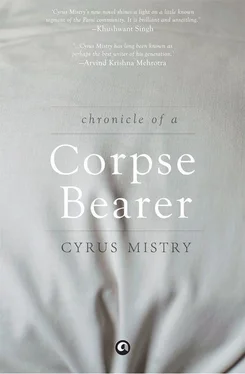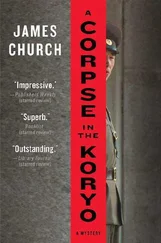Once an agreement was reached between trustees and corpse bearers, there was a large backlog of funerals to be cleared. For those next three days, a fair amount accrued to us khandhias and nussesalars by way of overtime. And the vultures, too, clocked in with precision once the strike was over. Though instinctually constrained from gorging, they, too, I presume, enjoyed a continual and unlimited feast.
Initially, the mood amongst us was jubilant and celebratory. Most of us were working fewer hours, and our monthly incomes had gone up. When I resumed work, along with all the others, nobody said a thing to me; I was pleased to have come out of this sorry and slightly desperate chapter of my life cleanly.
One night when, out of sheer boredom, Temoo rigged the power line from the lamp post outside his tenement to his radio (Yezdi ‘Electrician’ had done it for him several times before, and showed him how), through much static and radio noise, while randomly fiddling with the tuner on his set, he caught once again that woman’s voice we had first heard by chance about a month ago.
‘This is the Congress Radio calling on 42.34 metres from somewhere in India. Bapu’s message to all Indian people is very clear. These are his words: “Now we have given the call to our rulers to Quit India, every one of you should from this moment on consider yourself a free man or woman, and even act as if you are free and no longer under the heel of this imperialism. This is no make-believe. . You have to cultivate the spirit of freedom before it comes physically. . The chains of a slave are broken the moment he considers himself a free man.”’
For some reason, we all remembered Udham Singh, the martyr. It was perhaps two years ago All India Radio had informed us of a man who had shot Brigadier Michael O’Dwyer at a public meeting in London. The news was exhilarating. When given a chance to speak his final words before he was hanged, Udham Singh had simply said, ‘I have no regrets. I feel proud to be the one who executed the butcher of Jallianwalla. .’ To the memory of that Sardar’s raw courage, we drank that night what was probably an unreasonable quantity of hooch.
Two. Echoes of a Living Past
It startles me that in all these preceding pages not once have I attempted a detailed description, physical or otherwise, of my Sepideh; even though she was the centre of my life — still is , she remains there — as also, she must inevitably be of these copious, rambling notes. Having realized this, I ought at least to try. Though the very thought of such an effort makes me clammy, sinks my stomach into queasy disequilibrium — but why?
The answer is obvious. Seppy’s gone; and because she’s no more, I must rely solely on recollection to evoke what would surely have overblown into an impersonation larger than life. Do I need to fear this? How indeed could exaggeration creep into a description of someone who constituted my world, my whole life? Or am I being dishonest to persist in believing so?
How quickly it becomes difficult to remember a person who is dead with any sort of clarity. No matter how I may long to believe otherwise, there are no signs or messages from her, from the beyond, that she’s still there. Or, if she is, that she has any interest at all in the fate of us living. . The details are fading faster than I can hold on to them.

Though we enjoyed being together at all times, Seppy and I never did have much to talk about, or discuss. By way of shared experience, we began with little in common. And as far as the world outside was concerned, by no stretch of imagination or experience, was that our domain. Cut off, completely and irrevocably from it, all the news that ever filtered in from that world came by word of mouth, or emanated from the large wooden cabinet of a box-like radio that Temoo owned.
In his own estimation, ‘a priceless instrument’, the radio was manufactured in Germany, and had been acquired somehow by his late wife, Rudabeh, from some well-wisher in earlier days. No, in those early days, our living quarters were not electrified — no electric lights, no fans, no radios. We lived by candlelight and, if we ran out of those, or oil for the lamps, or kerosene, as was so often the case, natural light alone defined the shape of our waking hours.
Though electricity was in Bombay already, it was still just a bit expensive and there were relatively few domestic consumers. Buchia’s own office-cum-quarters had electricity. And one electric street lamp splashed a patch of brightness at the beginning of the wooded path leading to the upper funeral cottages; happily, this lamp post was situated immediately outside the khandhias’ tenement block. It was from the junction box of this lamp post that Yezdi ‘Electrician’—that’s what we called this lanky youth with the long hair and awkward, camel-like gait to distinguish him from Yezdi Tumboly, another more senior corpse bearer— would tap the line to power Temoo’s radio.
This was a covert operation performed only after sundown, for Buchia would never have countenanced such piracy. Initially, Temoo himself was terribly jittery about the entire undertaking: the very idea of stealing electricity, as much as of the perilous act of sticking a screwdriver into the T-shaped slit of the junction box to prise its lid open, then locating the tiny cranny pointed out to him by Yezdi (amidst a jumble of other wires and terminals) into which he must insert the open end of the extended power cord that snaked from the radio, out his window, along the ground and all the way up into the junction box. It did seem frighteningly unsound; but then, once accomplished, the radio— and Temoo, and several others from our community, too — came into their own.
Usually that street light was switched on at dusk. If not, he would call on me to hold up a candle or a kerosene lamp while, fumblingly, he sought to make contact. Yezdi had created a permanent joint for him to the radio’s power cord, increasing its total length by some eight or nine yards. He had warned Temoo repeatedly, of course, about the danger of coming into direct contact with a charge of electricity. No wonder Temoo was so jittery. But, over time, he grew more confident about rigging this clandestine power connection even when Yezdi wasn’t around to supervise.
You see, Temoorus was always terribly proud of his radio and had jealously protected it ever since it had been gifted to his wife; even in the days when it was no more than a mere showpiece that occupied one corner of his dining table — a mute wooden cabinet — he would wipe the dust off it with a soft cloth every morning, tending to it almost worshipfully as if it were a deity, or the very fountainhead — a magic box from which all knowledge and truth flowed. Now that it could be made to break its silence, he was overjoyed.
Whenever an event of any significance occurred in our country or the world, and we got wind of it from someone who had heard something, or seen a newspaper, the event or crisis immediately took on the excitement of a festive, social occasion in our small community of corpse bearers. For then — sometimes by advance notice, or prior submission — the power connection was rigged, the radio turned on, and the air became thick with voices, music and the crackle of static.
Word spread quickly. Anyone was welcome to drop in and listen, and subsequently, sit around airing views, analyses, predictions. If they had something to drink, or munch on at home, they were expected to bring it along — a sort of tithe or offering for the privilege of listening to these critical broadcasts. Most often, of course, nobody had anything of the kind, and they came empty-handed; but nonetheless felt free to hold forth.
Читать дальше













